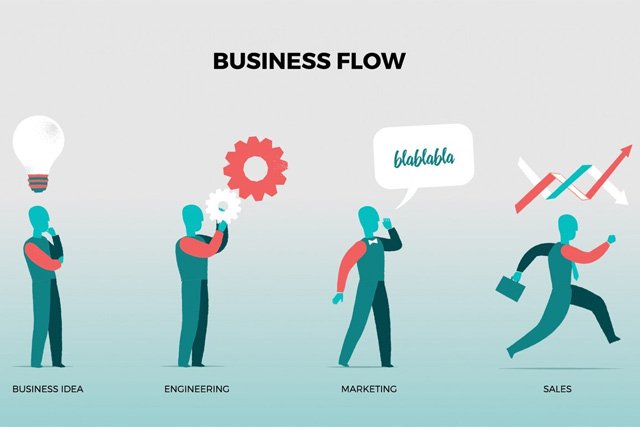In the dynamic realm of business, the definition of productivity has evolved beyond mere long hours on improving business and achieving goals efficiently. A productive team is often the result of a harmonious blend of support, a conducive work environment, and investment in individual growth. This article explores practical and beginner-friendly strategies about what can a business do to improve its productivity.
Setting Realistic Goals and Workable Deadlines

One of the fundamental steps to improve your business productivity is setting clear and achievable goals for your team. Ensure that these goals align with the skills and experiences of each team member to prevent discouragement. Equally important is establishing workable deadlines providing a roadmap for reliable and efficient workflow management. When employees have a purpose and a timeline, they are more likely to stay focused and motivated.
Creating a Work-Conducive Environment
Productivity thrives in an environment where employees feel comfortable and focused. Encourage a quiet and well-tempered workspace, allowing your team to concentrate on their tasks without feeling confined. Customization can be vital, as employees personalize their spaces for enhanced comfort and a sense of ownership. Additionally, minimizing distractions, such as eye-catching decorations or limiting internet access, can significantly boost concentration and reduce time-wasting activities.
Customization for Comfort
Allowing employees to personalize their workspaces fosters a sense of ownership, creating a more comfortable and enjoyable work environment.
Distraction-Free Zones
Implement measures to minimize distractions, creating an environment that facilitates deep concentration and minimizes time-wasting activities.
Investing in Technology

Outdated technology can act as a roadblock to productivity. Businesses should invest in up-to-date tools and software to streamline tasks and improve efficiency. Beyond hardware, consider incorporating productivity, communication, and storage programs like Trello, Slack, and Dropbox. Evaluate your workflow to identify areas that can be automated and invest in technology accordingly.
Harnessing Automation
Identify tasks within your workflow that can be automated, and invest in technology that streamlines these processes, saving time and increasing overall productivity.
Adopting Collaborative Tools
Integrate collaborative tools into your workflow to enhance communication and facilitate seamless information-sharing among team members.
Delegating Tasks Effectively

Proper task delegation is crucial for balancing workloads and building trust within a team. Managers should carefully assess each team member’s capacity and workload when assigning tasks. Effective delegation distributes responsibilities evenly and fosters collaboration, reinforcing that every team member is a valuable contributor working towards a common goal.
Balancing Workloads
Strive for an equitable distribution of tasks, considering each team member’s workload and capacity, fostering a sense of shared responsibility.
Building Trust Through Delegation
Delegating tasks effectively builds trust within the team, reinforcing the idea that each member plays a crucial role in achieving collective goals.
Polishing Workflows

Examine your existing processes to identify and eliminate bottlenecks that hinder progress. Streamlining workflows ensures that tasks are completed more seamlessly, preventing unnecessary delays. Employees can accomplish tasks more efficiently by simplifying processes, increasing overall productivity.
Identifying Bottlenecks
Regularly assess workflows to identify bottlenecks and inefficiencies, making adjustments to facilitate smoother progress.
Continuous Improvement
Foster a culture of continuous improvement, encouraging team members to propose and implement enhancements to existing workflows.
Providing Feedback and Training

Investing in employee growth is a long-term asset for any business. Regular feedback on performance, coupled with training opportunities, helps team members continually improve their skills. Positive reinforcement through acknowledgment of achievements further boosts morale and motivation.
Continuous Learning Culture
Establish a culture of continuous learning, providing employees with opportunities for skill development and professional growth.
Recognition and Reward
Celebrate individual and team achievements, providing positive reinforcement to motivate and acknowledge hard work.
Encouraging Breaks

A burnt-out team is an unproductive one. Encourage employees to take short breaks during the day to refresh their minds. Whether it’s a short walk, a snack, or a quick game, breaks can reenergize employees and enhance their focus when they return to their tasks.
Promoting Work-Life Balance
Emphasize the importance of work-life balance, encouraging employees to take short breaks to recharge and maintain optimal productivity levels to improve their business.
Creative Break Spaces
Create dedicated break spaces within the workplace, allowing employees to relax and recharge comfortably.
Rethinking Meetings

Long, unproductive meetings can be a drain on time and resources. Evaluate meeting agendas to determine if topics can be addressed more efficiently through notices or online discussions. When physical attendance is necessary, aim for concise meetings lasting between 30 minutes to an hour, eliminating unnecessary lulls.
Efficient Meeting Structures
Adopt efficient meeting structures, focusing on clear agendas and concise discussions to maximize productivity and minimize time wastage.
Virtual Collaboration
Explore virtual collaboration tools to facilitate online discussions, reducing the need for lengthy in-person meetings.
Making Schedules Flexible

Allowing employees to customize their schedules fosters a sense of responsibility and accountability. Whether working from home, adjusting work hours, or adopting a four-day workweek, flexible schedules empower employees to manage their time effectively, ultimately boosting productivity.
Remote Work Opportunities
Embrace remote work opportunities, allowing employees the flexibility to work from home and tailor their schedules to enhance work-life balance.
Four-Day Workweeks
Consider implementing four-day workweeks, providing employees with extended weekends, and promoting increased focus during shorter workweeks.
Trusting Your Employees

Avoid the pitfalls of micromanagement by trusting your team to perform their tasks effectively. Trust fosters a sense of value and self-reliance among team members, encouraging them to take ownership of their work. While autonomy is crucial, managers should be ready to offer support when needed.
Building a Culture of Trust
Cultivate a culture of trust within the team, emphasizing mutual respect and confidence in each member’s abilities.
Supportive Leadership
Provide support when needed, demonstrating that leadership is there to assist and guide, fostering a collaborative and supportive work environment.
Conclusion
In conclusion, creating an environment where employees can thrive, grow professionally, and feel like integral parts of a whole is the key to nurturing a genuinely productive team. A happy team is efficient, and this synergy is precisely what a company needs to achieve its business goals effortlessly. By implementing these comprehensive and beginner-friendly strategies, businesses can cultivate a culture of productivity, setting the stage for success in the ever-evolving world of work.





